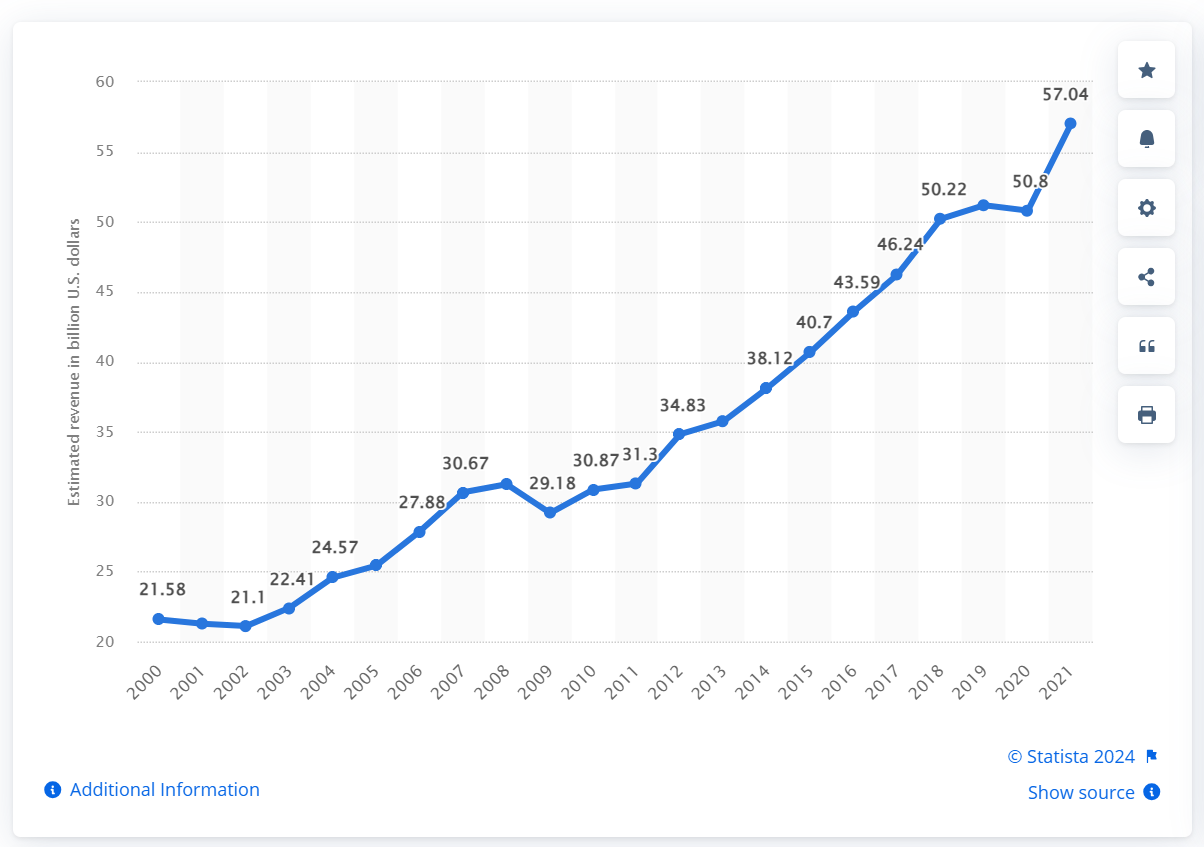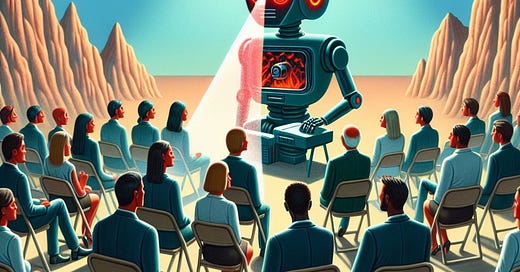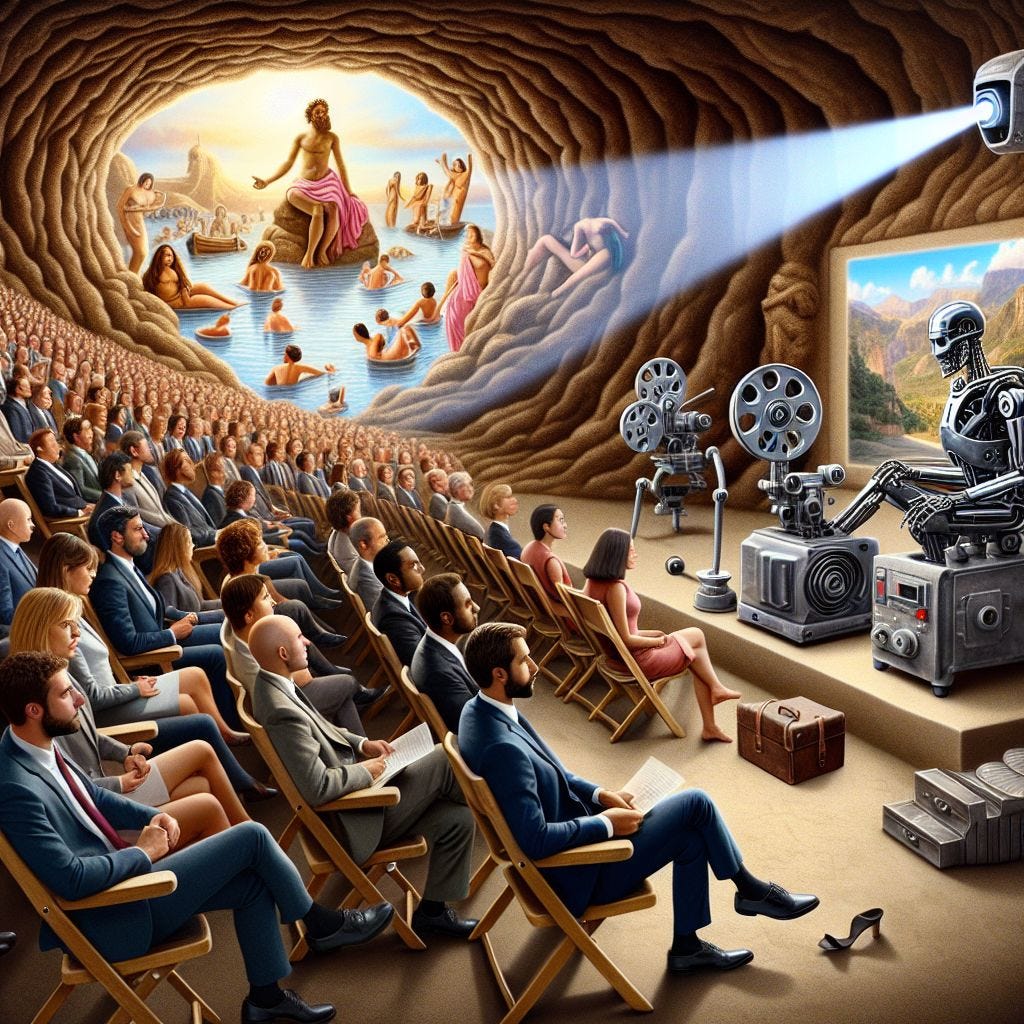AI is Coming for Your Job. Maybe.
AI is unproven from a macroeconomic productivity standpoint - and it should make human labor more expensive, not cheaper.
So much (digital) ink has been spilled when it comes to AI - it is the new bogeyman when it comes to the next phenomenon coming to take our jobs. In a matter of weeks/months/years we could be replaced by the machines that have driven insane business valuations to companies that don’t understand simple governance standards. That is, if the click-baity headlines are to be believed.
Sarcasm aside, AI will play a huge role in the labor market in the coming decades. It will help us eliminate human touch on the most mundane tasks while drastically reducing the doldrums of most jobs to help the humans behind them focus on what they’re actually being paid to do as opposed to devoting time to administrative tasks on top of their day jobs. And while this is coming, it’s not as close as it may appear. Re-adjusting our field of view to what’s beyond the cave-bound projectors, we can see that while AI will shift the way we work today, the reality is a lot less clear as to how and we still have time to help guide that transformation as opposed to simply being victim to it.
What does reality look like today?
The headline that AI is coming for your job is partially true, but dig in a bit deeper and it’s not nearly as apocalyptic as some might have you believe. According to a Forrester report published last summer, only 7.5% of marketing jobs are at risk due to full automation by AI by the year 2030.
And the tasks that AI will be taking over, at least within the marketing space, are tasks that I am highly annoyed my team has to do to begin with. Data and analytics is messy and it requires a team of analysts and associates from other departments to collect, collate, QA, and put into an output that makes sense. The time suck occurs in the collation and QA portion of it (even with Python automation that many teams have undertaken.)
I want AI to take the QA piece over. According to McKinsey, 30% of hours currently worked today can be replaced by AI by 2030. That seems in the ballpark with what I have seen from complex analytical accounts for entry-level analysts.
The shortsighted managers will see that number, turn around, and fire 30% of their staff to please the finance gods and make their bottom line look better. The managers who want to achieve business goals (as opposed to short-term quarterly numbers) will see that 30% of hours reduced by AI as an opportunity to uptrain and advance their analysts faster than they can today because every day/week/month they’re heads down on QA.
Good managers hire for traits like growth mindsets, willingness to learn, and proactive skills acquisition. And this will become even more crucial in this new world. The tasks AI are going to replace in the next half-decade are the hard skills that drive short-term results without necessarily driving long-term strategic vision. If you’ve hired for the long-term, you have a good foundation to build off of AI innovations within the workplace. If you’ve hired your team because they’re really good at what you need today without a view down the road of what’s needed tomorrow, now might be the time to worry.
But haven’t tech companies already reduced headcount via AI?
Two things are true: tech companies have recently laid off workers and tech companies (and some thought leaders) have recently said they have laid off workers because of advancements in AI.
Now, I don’t want to speak for the well-paid, powerful PR arms of places like Amazon and Google (or Professor Galloway), but this newsletter believes the reality of the matter looks different when you dig into the numbers. Some would have you believe the tech sector is in employment free-fall, shedding workers as fast as they can, but this doesn’t hold up.
Tech layoffs are happening, but the underlying reasons are to boost stock prices and correct an over-hiring spree that occurred a few years ago as soon as we found out that the Earth would continue to spin despite Covid-19. Last year saw a flat jobs market for the tech sector (they were actually up 700 jobs for the year) - this was after adding over a quarter of a million positions in 2022. One of the quickest ways to get a boost to the balance sheet (and to the stock price of your company, which foolishly translates into direct remuneration for CEOs) is to remove as many financial liabilities known as employees as you can while still running the business.
Now that we can leave our homes - travel, go out to dinner, go to the movies - the share of wallet dedicated to digital goods and services has to compete with experiences. That’s good news for the overall economy, but bad news for individual sectors like tech and shipping that were able to rely on consolidated consumer spending (and thus had to rapidly ramp up hiring to meet consumer demand.)
Is AI playing a role in these layoffs? I think it would be hard to make that argument, especially given that debate remains if we’re going to see major productivity boosts in the next decade from AI, with most experts believing we have not yet seen them manifest today. So maybe it’s happening on the fringes, but we’re simply not at a place where we can rely solely on AI for productive output - just ask the Scots.
Let’s Pretend the Headlines Are Accurate
AI reduces the mundane tasks - but not the deep thinking required to deal with the extremely unpredictable and irrational being that is the human. We owe a massive debt of gratitude to the late, great Daniel Kahneman for helping to prove that the economic theory of maximal self-interest isn’t nearly as solid as economists would have you believe.
But let’s fast-forward a few decades to the point where AI has become the panacea to busywork that its developers and proponents say it is. What that should do is actually make the cost of human labor for goods and services higher, not lower. Keep in mind my lens and bias here is the white-collar services industry. Let’s break it down in three scenarios.
1. AI wholesale replaces low-skilled employees
Employees whose sole raison d’etre is busywork will be phased out of an organization. I don’t see this being a huge portion of a workforce, as retraining and upskilling should be a company’s focus (see case 2) if they want to remain viable long-term.
But someone needs to stay on top of the AI - whether it be prompting it or ensuring it’s not straight up making things up. And someone needs to synthesize the increased outputs into something digestible on the client end. Those FTEs will cost more than your busywork FTEs. It remains to be seen what the equation will be and how much of a net gain/loss the employee cost will be on the P&L, but the premise that AI will wholesale remove people (and translate into insane cost savings) feels thin.
2. Existing employees are upskilled to manage and maintain AI
This would the base case according to this newsletter’s assumptions. While employees whose focus is QA and other low-value tasks will have a lot of that work replaced by AI, they will increase their productivity by managing the workflow going into AI and becoming expert prompters of it. They essentially turn into managers of the AI itself.
New skills and increased productivity translates into higher billable rates. Any headcount reduction should be offset by the increased FTE rate for workers now pumping out more work than ever in an eight hour day. The cost savings aren’t obvious here, but clients will get more out of their current FTE structure.
3. Increased AI output means more strategic managers
Regardless if we find ourselves in scenario 1 or 2 above, productivity per employee is supposed to increase significantly in the next 10-15 years. With AI focusing on the more mundane tasks (at least for now), more work than ever will need to be synthesized by middle managers and senior leadership for client ingestion.
Clients won’t like AI creating the work and grading it themselves before shipping it off to them. If there’s a mistake, or a question to go deeper on, or a desire to change strategy immediately, is the client simply going to write the prompts and go back and forth with the AI?
Some might say “Why not?”, but there’s a reason agencies exist today and there is a reason agencies will continue to exist in the future. If what agencies did were easy, clients would simply in-house everything they do. Instead, advertising agency revenue continues to grow. Besides, ask Pepsi how in-housing works out.

Using AI to attempt to save a few labor bucks is foolhardy; in reality maximizing the productivity it brings will require more strategic thinkers and managerial types to keep the human lens on the work and maintain the high level of service clients of premier shops have come to expect (and pay top dollar for.) And the addition of more high-level thinkers and thought leaders (you guessed it) costs more.
Two Final Thoughts
Both of these next paragraphs could be posts in and of themselves - and maybe they will be - but let’s leave them here as two interesting thought starters (thought continuers?) for AI and how it reshapes our lives.
First, we need to keep in mind the macroeconomic effects of AI. While we looked at this through the lens of marketing - a white collar profession made up of overeducated folks - the reality is that AI will take away jobs and those queued up first tend to lie on the lower end of the earning and educational requirement spectrum.
It remains a moral stain on the United States that the richest country on Earth still has a persistent poverty problem; AI will only exacerbate the wealth inequality currently plaguing the US. We need to seriously start talking about universal basic income, even if the most die-hard “tech optimists” who see AI as something that will take over everything are against it. There are optimists out there who believe AI will be more beneficial for all of society, but there is doubt that this will be the path forward for this technology. We’ll all need to try to stay on the right side of the pitchfork through all this.
Secondly, what can you do to get ready for the AI revolution? Learn how it works - bonus points if you’re learning how to code. You don’t need to stay a step ahead of AI (very likely impossible given the pace it’s evolving), but you do need to understand how it integrates into your workflows and how you can make it work for you as opposed to the other way around.
The doom and gloom about AI revolves around a narrative in which humans are victim to it, bordering on a subservience that would have us begging for a corporate John Connor to save us from our superpowered Excel macros. If that’s how you see AI, then you may very well fall into that trap. What I keep coming back to is the fact that humans are the ones creating AI and should be the ones benefiting from it.
We can make all the Terminator jokes we want (and believe me, I will), but approaching AI as the tool that it is, versus some vague sentient being, is a lot more productive and sets us up to constructively utilize it instead of waiting for some inevitability of automation via AI that may or may not materialize in the short term. It’s a tool - a powerful one, no doubt - but one that will still need humans directing it.
Figure out how to be one of those humans.
Grab Bag Sections
WTF April Fools: It likely comes as zero surprise, but I am not a fan of April Fools. Growing up, I once put green food coloring into the milk my mother had just bought at the grocery store the day before and feigned surprise when I opened the refrigerator the morning of April 1. That did not go over well - we weren’t poor growing up, but we weren’t a “Go ahead and buy as much milk as you want because we’re swimming in milk money” kind of family. Having ruined an entire gallon of milk was not the way my parents wanted to start their day (which, fair.) Since then, I’m not really a huge April Fools Day fan.
As an adult, I’m simply too busy to keep track of April 1 so I continually get let down by attempts at good-humored pranks that just leave me disappointed. Jessie Reyez - a previous AOTW recipient on this very newsletter - said she dropped a surprise album last night. When I clicked on the link this morning I was taken to a page declaring an April Fool’s. Not cool, Jessie.
I pledge this newsletter will never do April Fools - not only because I don’t buy into it, but also because I don’t keep track of it. Let’s all make similar pledges in our lives and leave AFD in the dustbin of history where it belongs.
Album of the Week: The Eagles were already insanely successful before the addition of bad boy guitarist Joe Walsh. The rock-heavy “Life in the Fast Lane” and insane solos on “Hotel California” show he was clearly an excellent addition to the group, even if he served as a last shot of adrenaline for a band on the verge of burnout.
Hotel California was the last great album from the Eagles. It’s also crazy to think it didn’t win album of the year at the ‘77 Grammys - that distinction went to one of the only albums that could have outdone HC: Fleetwood Mac’s Rumours (albeit without “Silver Springs.”) The Eagle’s next album The Long Run was good, but how do you live up to Hotel California (especially when the follow up was supposed to be a double-album but they couldn’t create enough songs to do that)?
I love me album deep cuts and “Wasted Time” fits that bill here. Also, to start the B side of the album with a reprise of it really highlights the difference between David Geffen’s approach (embrace aspect of musical theater in a rock album) and Clive Davis (piss Meat Loaf off enough to curse you out in the street outside your building.) One of the many reasons Geffen named his label Asylum, I suppose.
Quote of the Week: “The saddest aspect of life right now is that science gathers knowledge faster than society gathers wisdom.” - Isaac Asimov









